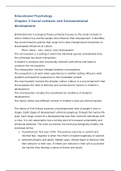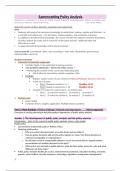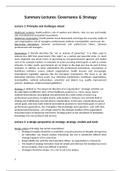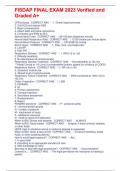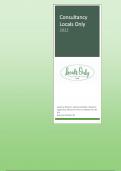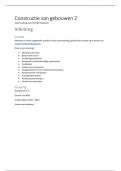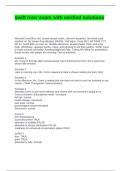Educational Psychology
Chapter 3 Social contexts and Socioemotional
development
Bronfenbrenner’s ecological theory primarily focuses on the social contexts in
which children live and the people who influence their development. It identifies
five environmental systems that range from close interpersonal interactions to
broad-based influences of culture.
Micro-,meso-, exo-, macro- and chronosystem
The microsystem is a setting in which the individual spends considerable time.
The individual has direct interactions.
A student is someone who reciprocally interacts with others and helps to
construct the microsystem.
The mesosystem involves linkages between microsystems.
The exosystem is at work when experiences in another setting influence what
students and teachers experience in the immediate context.
The macrosystem involves the broader culture. Culture is a very broad term that
encompasses the roles of ethnicity and socioeconomic factors in children’s
development.
The chronosystem includes the sociohistorical conditions of students’
development.
The theory shows how different context of children’s lives are interconnected.
The theory of Erik Erikson presents a developmental view of people’s lives in
stages. Eight stages of development unfold as people go through the human life
span. Each stage consist of a developmental task that confronts individuals with
a crisis. It is not catastrophic but a turning point of increased vulnerability and
enhanced potential. The more successful, the more psychologically healthy the
individual will be.
1. Trust/mistrust, first year of life. The positive outcome is comfort and
minimal fear, negative is when the infant is treated negatively or ignored.
2. Autonomy/shame and doubt, toddler years. Infants begin to discover that
their behavior is their own. If infants are restraint in their will or punished
too harshly they develop a sense of shame and doubt.
, 3. Initiative/guilt, early childhood. Children are challenged more because of
all the social contacts, they need to engage in active, purposeful behavior
that involves initiative. A child can develop guilt if they are irresponsible or
are made to feel too anxious.
4. Industry/inferiority, elementary school. A child energy is towards mastering
knowledge and intellectual skills. The danger is developing a sense of
inferiority, unproductiveness and incompetence.
5. Identity/identity confusion, adolescent years. It is about exploring who you
are and your future. If you do not adequately explore different roles and
don’t carve out a positive future path, they can remain confused about
their identity.
6. Intimacy/isolation, early adult. The developmental task is to form positive
close relationships with others. The hazard is that one will fail to form an
intimate relationship with a romantic partner and become socially isolated.
7. Generativity/stagnation, adulthood. It means transmitting something
positive to the next generation. Stagnation means the feeling of having
done nothing to help the next generation develop useful lives.
8. Integrity/despair, late adulthood. Reviewing live, reflecting what you have
done. If these are positive they develop a sense of integrity.
Four parenting styles (Baumrind)
Authoritarian parenting: restrictive and punitive. Parents want their child to
follow directions and respect them. They place limits and controls and
allow little verbal exchange. Children often behave in socially incompetent
ways. They tend to be anxious about social comparison, fail to initiate and
have poor communication skills.
Authoritative parenting: encourage children to be independent but still
places limits and control. Parents are nurturing and supportive. Children
tend to be self-reliant, delay gratification, get along, high self-esteem.
Neglectful parenting: parents are uninvolved. Children feel that parents
lives are more important. Children often are socially incompetent, have
poor self-control, don’t handle independence and aren’t motivated.
Indulgent parenting: parents are highly involved, place few limits or
restrictions. They let the child do whatever to create a confident, creative
child. Children don’t learn to control their behavior.
Chapter 3 Social contexts and Socioemotional
development
Bronfenbrenner’s ecological theory primarily focuses on the social contexts in
which children live and the people who influence their development. It identifies
five environmental systems that range from close interpersonal interactions to
broad-based influences of culture.
Micro-,meso-, exo-, macro- and chronosystem
The microsystem is a setting in which the individual spends considerable time.
The individual has direct interactions.
A student is someone who reciprocally interacts with others and helps to
construct the microsystem.
The mesosystem involves linkages between microsystems.
The exosystem is at work when experiences in another setting influence what
students and teachers experience in the immediate context.
The macrosystem involves the broader culture. Culture is a very broad term that
encompasses the roles of ethnicity and socioeconomic factors in children’s
development.
The chronosystem includes the sociohistorical conditions of students’
development.
The theory shows how different context of children’s lives are interconnected.
The theory of Erik Erikson presents a developmental view of people’s lives in
stages. Eight stages of development unfold as people go through the human life
span. Each stage consist of a developmental task that confronts individuals with
a crisis. It is not catastrophic but a turning point of increased vulnerability and
enhanced potential. The more successful, the more psychologically healthy the
individual will be.
1. Trust/mistrust, first year of life. The positive outcome is comfort and
minimal fear, negative is when the infant is treated negatively or ignored.
2. Autonomy/shame and doubt, toddler years. Infants begin to discover that
their behavior is their own. If infants are restraint in their will or punished
too harshly they develop a sense of shame and doubt.
, 3. Initiative/guilt, early childhood. Children are challenged more because of
all the social contacts, they need to engage in active, purposeful behavior
that involves initiative. A child can develop guilt if they are irresponsible or
are made to feel too anxious.
4. Industry/inferiority, elementary school. A child energy is towards mastering
knowledge and intellectual skills. The danger is developing a sense of
inferiority, unproductiveness and incompetence.
5. Identity/identity confusion, adolescent years. It is about exploring who you
are and your future. If you do not adequately explore different roles and
don’t carve out a positive future path, they can remain confused about
their identity.
6. Intimacy/isolation, early adult. The developmental task is to form positive
close relationships with others. The hazard is that one will fail to form an
intimate relationship with a romantic partner and become socially isolated.
7. Generativity/stagnation, adulthood. It means transmitting something
positive to the next generation. Stagnation means the feeling of having
done nothing to help the next generation develop useful lives.
8. Integrity/despair, late adulthood. Reviewing live, reflecting what you have
done. If these are positive they develop a sense of integrity.
Four parenting styles (Baumrind)
Authoritarian parenting: restrictive and punitive. Parents want their child to
follow directions and respect them. They place limits and controls and
allow little verbal exchange. Children often behave in socially incompetent
ways. They tend to be anxious about social comparison, fail to initiate and
have poor communication skills.
Authoritative parenting: encourage children to be independent but still
places limits and control. Parents are nurturing and supportive. Children
tend to be self-reliant, delay gratification, get along, high self-esteem.
Neglectful parenting: parents are uninvolved. Children feel that parents
lives are more important. Children often are socially incompetent, have
poor self-control, don’t handle independence and aren’t motivated.
Indulgent parenting: parents are highly involved, place few limits or
restrictions. They let the child do whatever to create a confident, creative
child. Children don’t learn to control their behavior.



